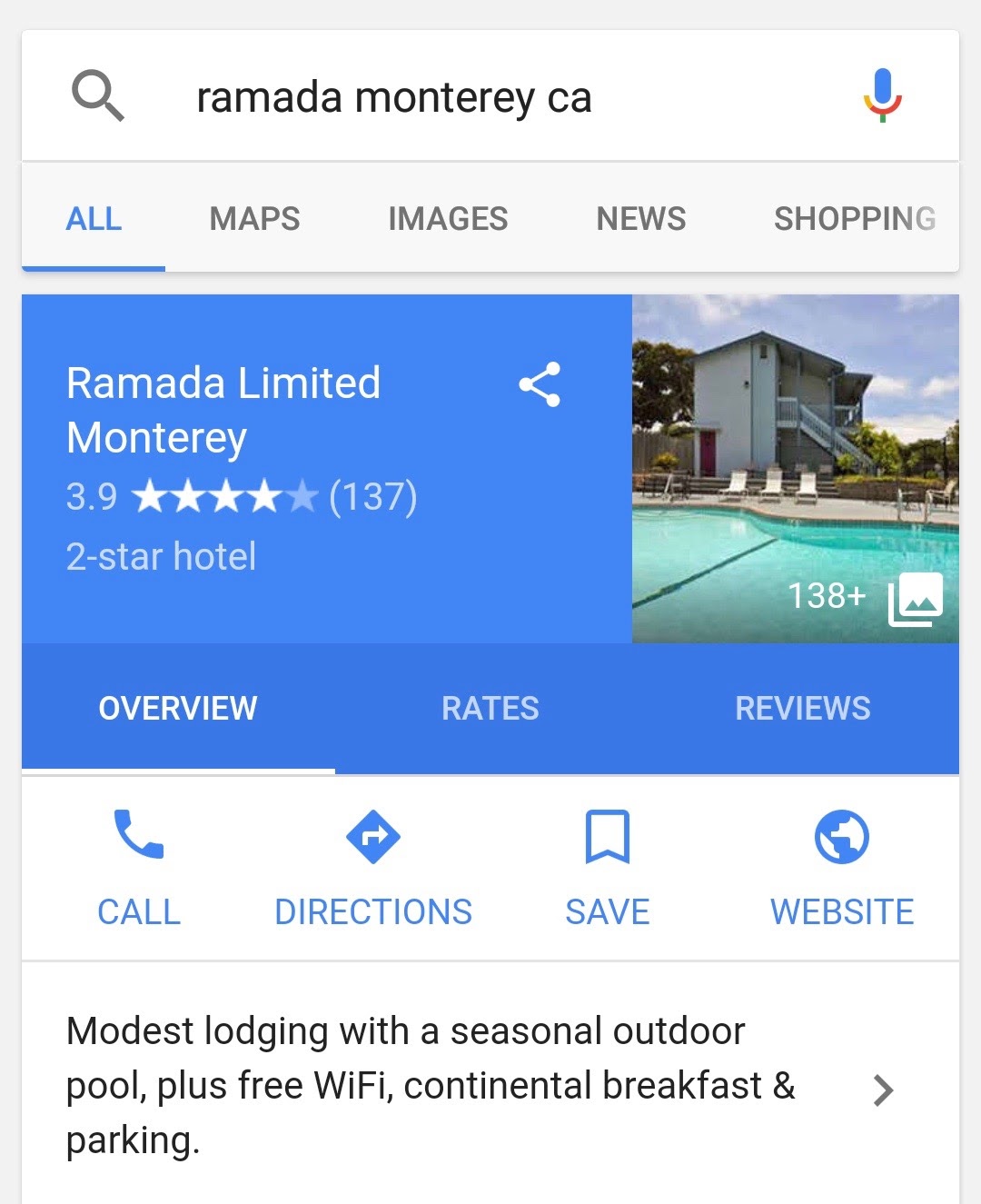
If you look at any of our industry blogs, you will hear the same chatter. "You need a responsive website," they proclaim! "Your page speed is too slow," they all say. You know what, though -- they are not wrong. They are, however, only looking at a few factors that will help your SEO on mobile.
Pick up your phone right now and do a search on Google for a key term that you believe that you should be ranking for. It could be something general, or it could be something more specific, like your brand, for example. Now take a look at the results.
There is a lot that is going on. Take note of what position your hotel is in. If you are number one organically, then good for you, you can stop reading right now. If you are anything else than number one, you are going to need to make some adjustments to your mobile SEO strategy.
Think about yourself for a minute. In all honesty, are you going to swipe up 3 or 4 times to find what you are looking for? Some people might, I know that I would, but do you think your potential customers would?
Now let's put away personal preferences here for a minute and talk about the upcoming mobile-first index. Let me also make it known that as far back as 2015, Google has reported having a majority of searches performed on mobile. These facts alone should get you on board with a mobile SEO mindset.
Long story short, Google is changing how they rank websites. Currently, they rank websites based on many factors that occur on desktop. Pretty soon, they are going to rank sites based on mobile-first signals. Click on the link above to read more on how this might affect your hotel.
So what can your hotel do to make sure that it is ready for this upcoming change?
Since we already mentioned them at the beginning, we won't go into too much detail. There is already a whole bunch of articles on these two subjects. First of all, you need to make sure that your website is mobile-friendly or else you will never even get the chance to compete. I prefer a responsive website because it makes a lot of SEO less time-consuming. Below are a few key points you should be aware of.
Have you visited a website on your phone, only to realize that you needed to pinch and zoom everywhere? I don't know about you, but I don't have any time for that! What about annoyingly long-form fills with no pre-populating text inputs. Oy. Make sure that you have an uncomplicated menu. The user needs to know where to complete the action they came to your site to take. The users also need to be able to search for the dates that they are looking for. Having a date picker is helpful, so users do not have to use the keypad to input dates. You also need to make sure that your booking engine is mobile-friendly. There are few experiences more painful than a non-mobile-friendly booking process.
The next quick point that we need to touch on is page speed. Remember that people may not always have the wifi speeds that our computers afford us. There are two tools that you can use to get your page speed inline. The first is from Google. The other is a site called Pingdom. Both of these websites will give you itemized suggestions. You can then give these suggestions over to your developer. Having these two aspects locked down will prevent users from pogo-sticking back to the SERPS from your website, which has been shown to hurt rankings.
If you do any type of Local SEO, then you are already familiar with Google My Business. This is Google's tool for businesses to manage their online presence across Google, including Search and Maps. If you search for your hotel on mobile, it should pop up in your results. It will look like this:

Do not just focus on Google. You also need to sign up for industry-specific listing sites such as TripAdvisor and Yelp. Having these profiles will allow you to take up more space in the search engine results page (SERPS). This could push competitors further down the page since they could be deemed as less relevant, depending on a user's search.
Google is smart, like, brilliant. There are, however, limitations to their smartness. Much of the Google luster has come from computers and algorithms. You have to realize that even though machines can do a lot, there is also much that they cannot do. That is where structured data comes into play.
Structured data is a way to add some extra content to the elements that are on your website. If inserted correctly, it will make your organic search listing stand out.
Are you a business? Use structured markup! Does your hotel have a physical location? I sure hope so. Use structured markup! Do you host events in your meeting spaces? Use structured markup! Do you have reviews! Use structured markup!
The combinations and applications for hotels are numerous. Here are just a few that are recommended for hotels on Schema.org.
These are not SEO focused but will help you gain more share of the search engine results page. I also have to mention that hotels really should be on these two platforms. These two platforms almost always dominate the more commercial queries in our industry. Price ads are great for hoteliers that are diligent with rate parity. The way that it works is you tie the listing to your booking engine. These ads will pull up prices for hotels. If you are not in parity, then you are wasting this opportunity because competitors (OTA's) will appear to have a better price. You can't win the customer if you are out of parity with an OTA. They will take that business every time.
AdWords is a great tool, as well. AdWords ads typically get shown first on mobile devices, so getting a number 1 ad there could make a massive difference for your business. Just keep in mind when creating the ads that you are presenting these on mobile, so you should make sure that you are targeting the intent of that user. As the data builds, you can use it to aid your SEO efforts. See what is working on paid and apply it to your SEO strategy.
Having a sound SEO strategy for mobile can help your hotel outperform the competition. If you have these elements locked down, you can dominate the mobile SERPS! Getting your hotel in front of mobile customers can help you increase traffic to your site, which should raise brand awareness, which will increase revenue at your hotel. So, what are you waiting for? If you need help troubleshooting a mobile-move, or have any general SEO related questions, feel free to contact us. You can also contact me directly on LinkedIn.
Google's mobile-first index primarily crawls and ranks the mobile version of a site. If your hotel's mobile pages are slow, hard to navigate, or missing content, rankings drop on all devices. Optimising the mobile experience is now the foundation for visibility and bookings.
A responsive design automatically adjusts layout, images, and functions to any screen size, eliminating pinch-and-zoom frustration. Search engines favour sites that deliver seamless usability, so a responsive hotel website increases dwell time, reduces bounce rates, and improves your chances of owning top mobile positions and direct reservations.
Google PageSpeed Insights and Pingdom both analyze your pages, flag oversized images, render-blocking scripts, and server delays, then provide step-by-step fixes you can send to developers. Implementing their recommendations trims load times, keeps guests from pogo-sticking back to search results, and boosts overall mobile ranking signals.
Complete, consistent listings on Google My Business, TripAdvisor, and Yelp give your hotel multiple chances to appear on mobile results and maps. Reviews, photos, and accurate NAP data strengthen relevance and trust, pushing competitors down and funneling more local traffic directly to your site and booking engine.
Hotels should mark up business details, addresses, reviews, prices, events, and room offers with Schema.org structured data. This helps Google read context, enabling rich snippets like star ratings, price ranges, and availability that draw attention on small screens and can meaningfully lift click-through rates.